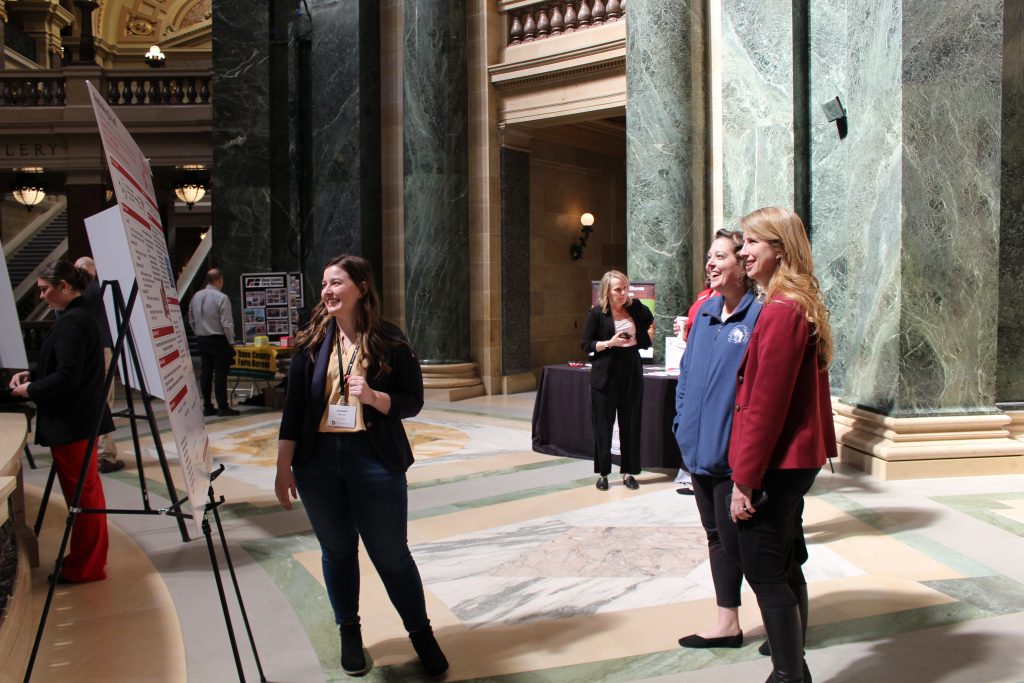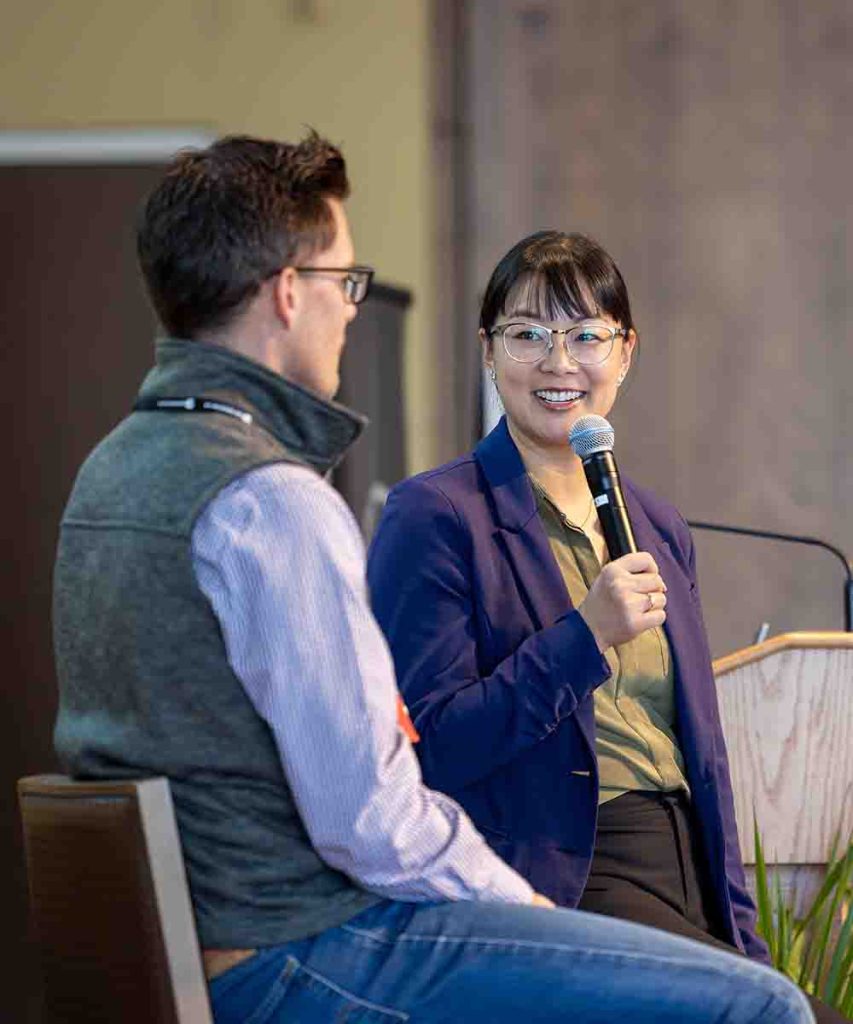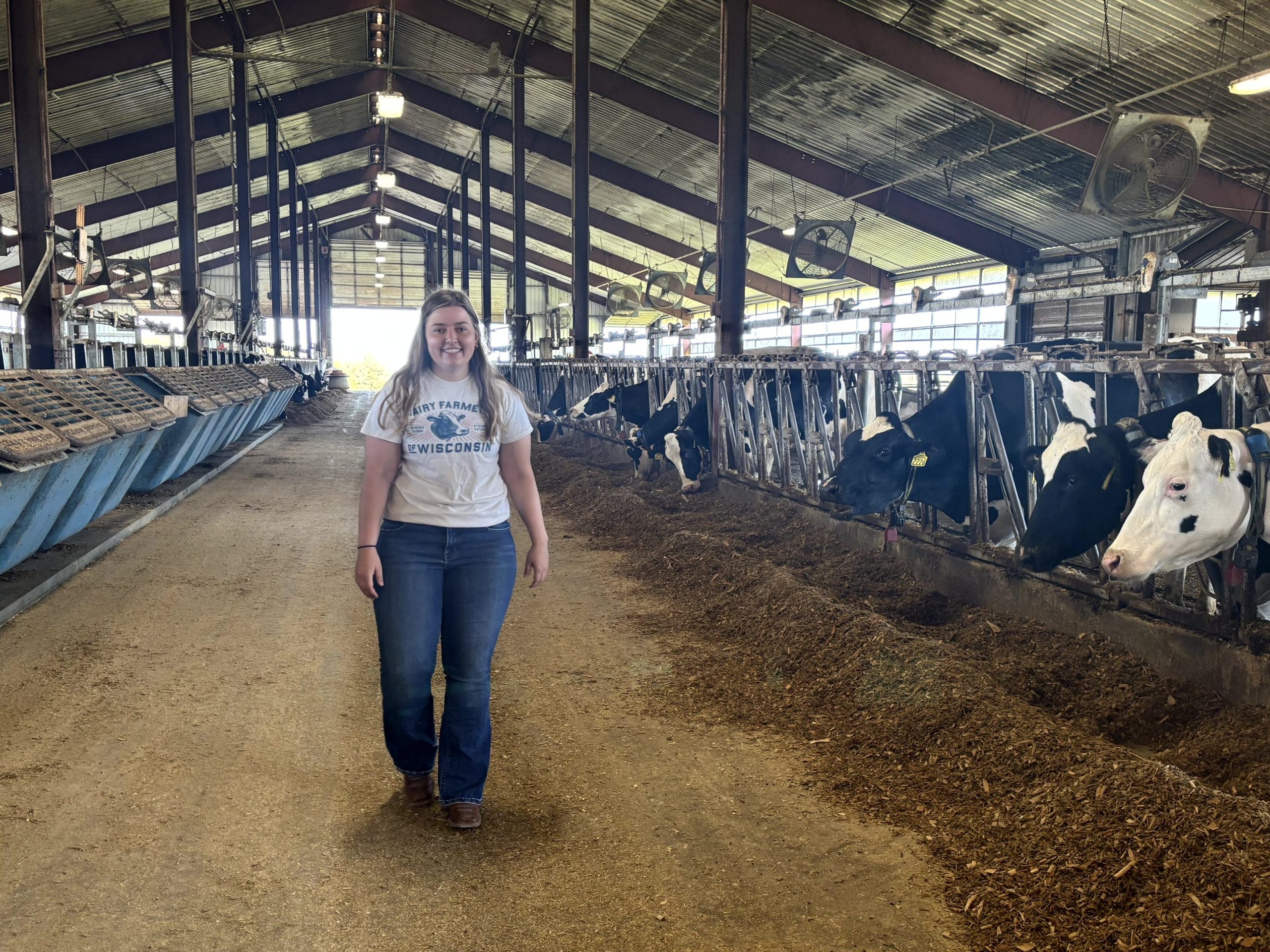
Elizabeth McGuire speaks at the Nov. 20, 2024 Dairy Summit event hosted by UW-Madison in Madison, Wis.
Elizabeth McGuire’s journey might seem unconventional, but for her, it’s been a natural evolution. With deep roots in rural Wisconsin and a lifelong connection to agriculture, McGuire has always been drawn to the rhythm of farm life and the well-being of animals. Having just finished her master’s degree in dairy science at UW–Madison, she’s bringing together her background in education, her love for cows, and a fascination with agricultural technology to address a critical question in the industry: Can robotic milking systems be used to improve the dry-off process for dairy cows?
Her research, which explores gradual, cow-driven dry-off using automatic milking systems, is not only innovative, but also collaborative. The project bridges expertise across three University of Wisconsin campuses: Madison, Platteville, and River Falls, and is supported by the Dairy Innovation Hub. It also reflects McGuire’s broader mission: to create science-based, animal-centered solutions that can be implemented on real farms.
Growing up dairy: roots in rural Wisconsin
McGuire’s passion for dairy began on her grandparents’ farm in southern Wisconsin, where she spent her childhood working with livestock and helping with barn chores. Those early experiences sparked a deep appreciation for animals and the people who care for them. Her involvement grew through FFA and the Green County Dairy Queen program, where she developed leadership skills and a strong sense of pride in representing the agricultural community.
When it came time for college, UW–Platteville was a natural fit. Its hands-on agricultural programs and close-knit campus environment gave McGuire the tools and connections to grow her knowledge and confidence. “I appreciated its proximity to home, the practical curriculum, and the opportunity to build meaningful relationships with professors and peers,” says McGuire. It also set the stage for the next chapter of her journey, graduate research in dairy science focused on improving animal welfare.
From the classroom to the research barn: finding a new way to teach
After earning her degree in agricultural education from UW–Platteville, McGuire began her career teaching high school agriculture. “Teaching was incredibly rewarding. I loved working with students and watching their curiosity grow,” says McGuire. “But I realized how much I missed working directly on farms. That year was truly formative and helped clarify what I value most in a career.”
That realization led her to UW–Madison’s dairy science master’s program, where she joined a cross-campus research project supported by the Dairy Innovation Hub. Her study on cow-centered, robotic dry-off methods brought together UW–Platteville’s facilities, and faculty mentors from UW–River Falls and UW–Madison. While shifting from the classroom to the lab, McGuire kept her educator mindset. “My teaching experience has been incredibly valuable – I’ve exposed several undergraduate students to agricultural research and provided guest instruction in classes, allowing me to stay connected to education in a new way.”

Robotic dry-off: rethinking an industry norm
In the dairy industry, the dry-off period, the time when cows stop producing milk before they have a calf and begin their next lactation, has long followed a universal approach: abrupt cessation of milking. While this method is widespread, it can cause discomfort and increase the risk of intramammary infections as milk accumulates in the udder. McGuire saw an opportunity to explore something different.
Through her master’s research at UW–Madison, McGuire investigated whether robotic milking systems could support a gradual, cow-driven dry-off approach. These increasingly popular systems let cows choose when to be milked and could allow them to taper off naturally, reducing stress and improving welfare.
“My research focused on how different dry-off strategies, specifically abrupt versus gradual cessation of milking, affect a cow’s productivity, behavior, and udder health. We found notable differences in behavioral patterns and indicators of discomfort, suggesting that a more individualized, gradual dry-off approach can better support cow welfare while remaining practical for farmers,” says McGuire.

Her research showed that higher-producing cows took longer to dry off voluntarily than lower-producing cows, supporting the idea that not every animal should follow the same timeline. The study revealed key differences in behavior, signs of udder discomfort, and milk leakage between abrupt and gradual dry-off groups.
“This approach uses readily available technology to allow for customized dry-off protocols for individual cows, depending on their level of milk production. It is analogous to a step-down weaning program for calves—where milk intake is gradually reduced over time to help transition to solid feed— but from the cow’s perspective,” says Jennifer Van Os, associate professor and dairy animal welfare extension specialist in the UW–Madison Department of Animal and Dairy Sciences.
Kate Creutzinger, who helped initiate the project while at UW–River Falls, emphasized the value of approaching dry-off from the cow’s perspective. “Seeing what cows will do when given control over their time to dry-off and how motivated they are to be milked after dry-off, can provide insight into the cows’ feelings around dry-off and information for data-driven decision making about the end of lactation.”
By working across campuses and incorporating the strengths of each institution, McGuire’s study stands out not only for its insights but for its practicality. Her findings offer dairy farmers using robotic systems a path to more humane, efficient dry-off protocols, potentially reducing mastitis risk and improving transition into the dry period.
Strength in collaboration: the three-campus partnership
Behind the success of McGuire’s graduate research is a unique three-campus collaboration between UW–Madison, UW–Platteville, and UW–River Falls. “UW–Madison provided expertise in animal welfare science and a strong, collaborative lab community that I’m incredibly grateful for. UW–Platteville supported on-farm research logistics, while UW–River Falls offered valuable input and mentorship,” says McGuire.

From UW–Madison, McGuire was mentored by Van Os, who praised her ability to adapt quickly to animal welfare science despite coming from a teaching background. “She often brings unexpected and valuable insights to our lab group’s discussions about animal welfare research methods. Elizabeth is passionate about making a practical, positive impact for the dairy industry, and I see a bright future ahead of her,” says Van Os.
UW–Platteville’s Pioneer Farm provided the ideal setting for robotic milking research, guided by Ryan Pralle. “Elizabeth stood out as a very independent student researcher. Over the course of the study, she grew in her ability to work with a diverse team across in-person and virtual settings,” he says.
Kate Creutzinger, formerly of UW–River Falls, helped launch the project and continued her support after transitioning to the University of Vermont. The Dairy Innovation Hub made the collaboration possible, offering funding and connection across institutions. “This funding creates opportunities to discover better methods for improving dairy cow welfare and to develop solutions that benefit dairy farms, such as reducing labor needs or enhancing cow health,” says Creutzinger.

Looking ahead: bridging research and practice
As McGuire prepares to complete her master’s degree, she’s focused on what comes next, but her vision is clear: she’s determined to stay grounded in the dairy community and advance science that makes a real impact on farms. “Staying connected to rural communities is important to me, and I would love to stay in Wisconsin,” McGuire says. Her research on robotic dry-off methods has already gained interest from both farmers and scientists, highlighting how technology can be used to individualize care, reduce mastitis, and improve animal welfare.
Looking ahead, McGuire is open to a range of careers that keep her rooted in animal agriculture, whether in research, outreach, or innovation. “I hope to bridge the gap between science and on-farm practices. My goal is to help ensure the dairy community continues to evolve in ways that support both animal well-being and the long-term sustainability of farming,” she says. No matter the setting, her focus remains the same: applying science to improve life for cows, support farmers, and help shape the future of dairy.

